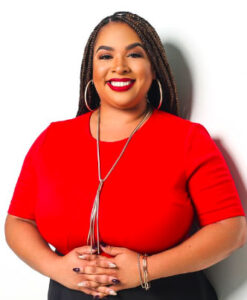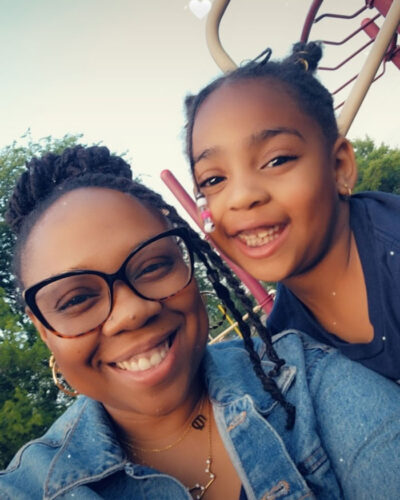St. Louis Advocacy Group Trains Parents, Students to Improve Struggling Schools
Struck by how far behind St. Louis schools were in funding and proficiency levels, ActivateSTL founder set out to get ‘parents in seats of power.’

Get stories like this delivered straight to your inbox. Sign up for The 74 Newsletter
When Shae Lowman moved back to St. Louis, after more than 15 years away, the city had changed — there was more crime, specifically gun violence — and so had Lowman’s life. Now she had a small daughter to care for.
She chose to enroll her daughter in Atlas Elementary, a public charter school in the city’s Downtown West neighborhood. Her daughter settled into kindergarten, but Lowman didn’t feel at home in her old hometown.
Volunteering at a school enrollment fair, Lowman stopped and talked with the women at the Activate STL table. What happened next would help Lowman find a community and become deeply involved in her daughter’s education. She spent the next several months engaged in a combination of research and learning, being coached to understand how to create change in schools.
Founded in January 2022 by a former educator, ActivateSTL trains parents and teens in St. Louis to advocate for quality education. This training and support is needed, parents say, because public schools in St. Louis are so inequitable and rank so poorly on standardized tests. White children are five times more likely than Black children to attend schools where it’s the norm for students to meet math and language arts standards, according to Missouri state data.
In June, ActivateSTL began its first training cohort with 17 parents and 11 students. It started with a data download: Who’s in charge of traditional public and charter schools — from local school boards to state officials — how do St. Louis’s suspension rates vary by race and gender and what are the student proficiency outcomes at the state, district and individual school levels?
“I had no clue that public school scores were as low as they were,” said Lowman. “Looking at those numbers, that was disheartening. Since then, I’ve been more involved, and not just in the fun stuff, for my kid and others as well.”

That’s the kind of insider understanding that Tiara Jordan wanted to give parents when she started ActivateSTL. Jordan, who is Black, attended mostly white schools when her parents moved the family to an affluent district outside of Flint, Michigan. She saw how assertive white parents were about advocating for their children. Later, while studying to become a teacher, she saw how broken and under-resourced many urban schools are.
“I was blessed and fortunate,” she said. “Not everybody has the resources to up and move to a better school district.”
Jordan worked as a teacher and principal in Chicago, Cleveland and New York. She opened new charter schools in Chicago and Brooklyn and experienced the benefits that charter schools, which are publicly funded but privately run, can offer communities where public schools are failing. When she moved to St. Louis in 2019, she connected with the St. Louis-based education nonprofit Opportunity Trust and was struck by how much work needed to be done to address inequities in the city’s schools.
“How is it that Chicago, D.C. and other cities have figured this out [better]?,” she recalls wondering. “What is happening in St. Louis that it could be so behind in funding, and proficiency levels?”
But she was new to town, so she spent some time meeting with parents and education advocates and was struck again: so many parents weren’t aware of how badly the city’s schools were struggling.
“I didn’t want to define what ActivateSTL was without knowing the community,” she says. “We’re mobilizing parents and developing their leadership skills, so they can drive the plan of attack.”
Fully funded by the Opportunity Trust, ActivateSTL has three full-time employees, including Jordan and St. Louis educator LaShonda Hill. They are part of a national movement that has only grown since the pandemic — with groups like Ed Navigator and the National Parents Union — to help parents become smarter public education consumers and savvier advocates for change.
Parents, Jordan says, have more power than they realize to put pressure on state, district and charter officials.
“Our end goal is to get parents in seats of power,” Jordan said. “Going to a white, affluent school, I saw how much influence parents could have.”

With support, parents with ideas for how schools can improve might be able to make positive changes. After moving her dyslexic daughter out of several schools because they weren’t providing adequate support, Kathryn Bonney found a private school that offered life-changing tutoring.
“The impact it had on my child was night and day. Utterly transformative,” said Bonney, who is white.
She wondered, what would it take to bring this kind of high-quality tutoring to all St. Louis children with dyslexia? She happened to have a conversation with Tiara Jordan, who encouraged her to pursue the question.
“ActivateSTL is specifically geared toward parent organizing and leadership,” Bonney said. “Parents like me who have really big ideas.”
She joined the training cohort and got help fleshing out her goal — to have tutors trained in Orton-Gillingham, a highly structured, phonics-focused method of reading instruction, present in all St. Louis elementary schools. In addition to meeting other parents passionate about advocacy, she found a mentor in Jordan who assigned Bonney homework to advance the tutoring project: create a pitch deck in PowerPoint or meet with tutoring providers, for example. She also checked in every week to see what progress was being made, Bonney said.
Jordan has an understanding of how educational systems work: who makes decisions at school sites as well as downtown at the central office and in the state capitol. She passes that knowledge on to parents and helps them understand how they can ask for what they want.

When Shae Lowman’s first-grade daughter was struggling with reading, Lowman didn’t know where to begin to address the problem.
“Tiara did a presentation about who to start with,” Lowman said. “I sent my daughter’s teacher a text and the next week they had my daughter reading. Having the courage and support to point out the discrepancies my daughter was having is fabulous.”
Older students, Jordan believes, can advocate for themselves, with the right support. During a summer training cohort for high school students, 10 teenagers were paid $20 an hour to meet every day for a month. Jordan explained the history and principles of public education and took students on field trips, showing them what the affluent schools in St. Louis look like. They got a bird’s eye view of how unequal school funding really is.
“I want to be an actor and my school took away the theater program,” said Alana Wilson, a senior at KIPP High School. The ActivateSTL training included information about budget transparency, which means parents and students have a right to see how money is spent at the school. “Why is my intended major being replaced with political science?” Wilson asked.
Wilson, who said she is usually “shy and quiet” has now joined the student council. Together with other members, she asked to meet with the school principal to present a petition, signed by students who want bottled water to be available in the cafeteria in addition to milk, but the principal said it wasn’t her decision to make. Wilson said she’s trying to figure out a different way to handle the situation.
“Before the cohort, I never would have opened my mouth,” Wilson said. “I learned that I have a voice and I don’t have to be silenced by the system.”
The Opportunity Trust provides financial support to The 74.
Get stories like these delivered straight to your inbox. Sign up for The 74 Newsletter

;)